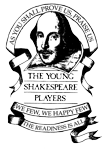Books Published by The Young Shakespeare Players
The Actor’s (and Intelligent Reader’s) Guide to the Language of Shakespeare, by Richard DiPrima
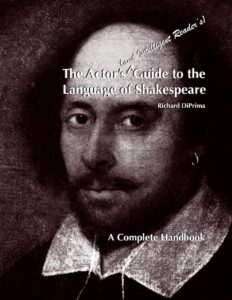 Yes, there is a reason for yet another book on the language of William Shakespeare. This one is intended to help the actor (or intelligent reader) to master the forms of Shakespeare’s language. Anyone who acts Shakespeare’s plays really well must have a deep familiarity with, and a confident feel for, the language of his plays. Anyone who reads Shakespeare’s plays really well must be a Shakespearean actor deep inside his or her mind.
Yes, there is a reason for yet another book on the language of William Shakespeare. This one is intended to help the actor (or intelligent reader) to master the forms of Shakespeare’s language. Anyone who acts Shakespeare’s plays really well must have a deep familiarity with, and a confident feel for, the language of his plays. Anyone who reads Shakespeare’s plays really well must be a Shakespearean actor deep inside his or her mind.
The Young Shakespeare Players have always placed basic emphasis on the words of Shakespeare’s plays — the unlimited resonance of those words, their precise and evocative beauty. In the early 1980s, finding inadequacies in the many published works on the subject, YSP co-founder Richard DiPrima began to develop the RISARA model for understanding the key technical elements of Shakespeare’s texts. The Actor’s (and Intelligent Reader’s) Guide to the Language of Shakespeare is the culmination and documentation of that model, bringing to life the six RISARA elements in detail—Rhythm, Imagery, Sound, Antitheses, Repetition, and Architecture. Through this book, serious actors and readers everywhere can immerse themselves in the textual depth that DiPrima has been teaching for decades to young (and not so young) actors in YSP’s Focused Workshops.
Praise for The Actor’s (and Intelligent Reader’s) Guide to the Language of Shakespeare:
“Richard DiPrima brings a lifetime of experience as a theatre practitioner to this work; an impressively scholarly and comprehensive guide to the structures and intricacies of Shakespeare’s language. It is a hugely ambitious undertaking and the end result displays a wealth of insight and understanding. This offering will prove an invaluable asset to any serious student of Shakespeare, whether actor or reader.” — Dr. David Crilly, Artistic Director of The Cambridge Shakespeare Festival, UK
“In my 50 years of performing the classics, I have not seen so comprehensive a guide for the use of Shakespeare’s language. …Every serious student of Shakespeare should own a copy.” —Randall Duk Kim, World-renowned Shakespearean actor, film actor, and co-founder of the American Players Theatre.
“Astounding…. I marvel at the years of experience and vast knowledge contained within its pages. Has there ever been an encyclopedia of the technical components of Shakespeare’s writing? In this age of abbreviated computer language, abridged texts and speed-driven learning, you are so brave to create such a document. I cannot tell you how many times I have craved a book to pass on to acting students in need of a clear and comprehensive knowledge of Shakespearean usage. So, thank you.” —Anne Occhiogrosso, Shakespearean actress, director, acting coach and teacher, and co-founder of the American Players Theatre
The DiPrima/RISARA Editions of Julius Caesar, King Lear, Macbeth, and King Richard II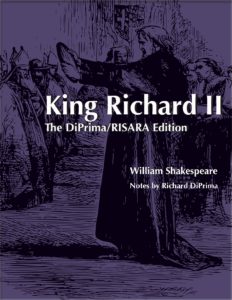
So far, YSP has published comprehensive annotated editions of four of 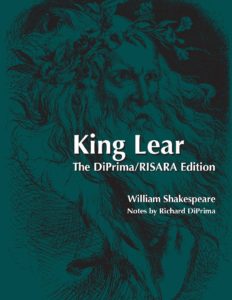 Shakespeare’s plays: King Lear, Julius Caesar, King Richard II, and Macbeth.
Shakespeare’s plays: King Lear, Julius Caesar, King Richard II, and Macbeth.
There is a simple, ambitious objective of YSP’s DiPrima/RISARA Editions: To give the actor or intelligent reader a clearer, deeper way to understand Shakespeare’s texts than exists in any other edition yet published.
What did Shakespeare mean, and how did the way he wrote help him express his meaning?
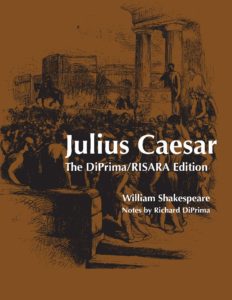 The DiPrima/RISARA Editions bring the texts of these plays fully within the range of perceptions of the interested modern reader or actor, using an innovative dual-notation system that clarifies meaning while simultaneously illustrating and explaining the technical devices that make Shakespeare’s writing work so well.
The DiPrima/RISARA Editions bring the texts of these plays fully within the range of perceptions of the interested modern reader or actor, using an innovative dual-notation system that clarifies meaning while simultaneously illustrating and explaining the technical devices that make Shakespeare’s writing work so well.
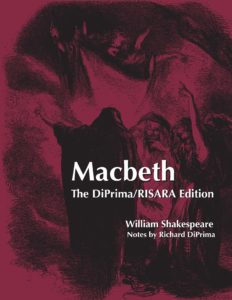
These technical notations — unlike notes in any other annotated work of Shakespeare — allow the reader to see how YSP’s groundbreaking RISARA elements (Rhythm, Imagery, Sound, Antitheses, Repetition, and Architecture) contribute to the drama and poetry of Shakespeare’s plays.
Our Mutual Friend: The Stage Play
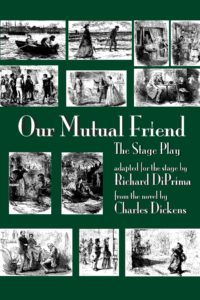
Our Mutual Friend, the final novel completed by Charles Dickens, is a vast, sweeping tale of money, social class, mystery, murder, and love gone both wrong AND right. Written at a time when Dickens was absorbed by his own dramatic readings of his works in theaters, it is itself a highly dramatic tale—filled with humor, surprise, theatrical characters and profound emotions. The famed 19th-Century poet, playwright, novelist, and critic Algernon Charles Swinburne said of Our Mutual Friend: “This is the author’s last great work: the defects in it are as nearly imperceptible as spots on the sun or shadows on a sunlit sea.”
Now, for the first time, YSP co-founder Richard DiPrima has rendered this masterpiece into a stage play parallel in scope to the great 1980s David Edgar-Royal Shakespeare Company production of Nicholas Nickleby. First performed in 2011 by The Young Shakespeare Players, Our Mutual Friend: The Stage Play is truly faithful to and worthy of the original novel.
More Things in Heaven and Earth: What the Young Shakespeare Players Have Taught Us All About Human Potential
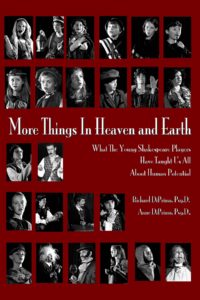 Richard and Anne DiPrima — calling on their dual professions as the creators and artistic directors of The Young Shakespeare Players (YSP), and as clinical psychologists — have written this book to help tell the story of YSP and its significance. They created The Young Shakespeare Players in the early 1980s, in large part to prove that young people everywhere are smarter, and more capable, than our culture or schools seem to believe. Since 1980, YSP has created more than 200 major productions of classical theater — in Madison, WI; Chicago; and New England — in which many hundreds of casts of young actors have performed, uncut, the works of Shakespeare and (later) G.B. Shaw, as well as major dramatic adaptations of the works of Charles Dickens. YSP has also conducted scores of seminars on Shakespeare’s language for participants ranging from young people to post-doctoral adults.
Richard and Anne DiPrima — calling on their dual professions as the creators and artistic directors of The Young Shakespeare Players (YSP), and as clinical psychologists — have written this book to help tell the story of YSP and its significance. They created The Young Shakespeare Players in the early 1980s, in large part to prove that young people everywhere are smarter, and more capable, than our culture or schools seem to believe. Since 1980, YSP has created more than 200 major productions of classical theater — in Madison, WI; Chicago; and New England — in which many hundreds of casts of young actors have performed, uncut, the works of Shakespeare and (later) G.B. Shaw, as well as major dramatic adaptations of the works of Charles Dickens. YSP has also conducted scores of seminars on Shakespeare’s language for participants ranging from young people to post-doctoral adults.
The present book is designed to distill the main lessons that young YSP participants have demonstrated to the world about what we all are capable of, intellectually and emotionally. As one YSP parent said: “In addition to … understanding and performing Shakespeare’s beautiful, complex, multi-layered language, … there is always the subtext: If they could do Shakespeare, what else have they been told they couldn’t do that they should try anyway?”
This book explores the YSP experience in relation to such topics as brain neuroplasticity, development of empathy, the critical role of language in complex thinking, memorization, and allowing young people executive responsibility in pursuing a worthwhile superordinate goal.
